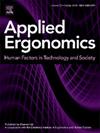Experimental Investigation of the Efficacy of Preemptive Tilting Seats in mitigating Carsickness
IF 3.4
2区 工程技术
Q2 ENGINEERING, INDUSTRIAL
引用次数: 0
Abstract
Carsickness (CS) experienced by vehicle passengers is a critical unsolved challenge that impacts existing human-driven vehicles and may limit the adoption of future autonomous vehicles. If CS is reduced, then passengers can perform productive tasks during their commutes. Prior research has demonstrated that a preemptively triggered tilting seat system (TSS), i.e., a seat that tilts the passenger in the direction of the vehicle's turn, can reduce CS response. However, no previous investigations have studied the impact of TSS on passengers performing representative productive tasks when riding a real vehicle under realistic driving conditions. This paper addresses this gap by presenting a human subject study to quantify passenger CS response and assess their task performance in the presence of a preemptively triggered TSS. Twenty-nine healthy adults with varying levels of self-reported motion sickness susceptibility participated in the study across two test conditions. This is the first in-vehicle study that assessed both CS response and passenger task performance for a diverse sample of passengers under realistic driving conditions emulated on a closed test track. The results from this study demonstrated that a preemptively triggered TSS reduces CS scores for male passengers and has no negative influence on their productive task performance. The results also demonstrated that a preemptively triggered TSS did not have an effect on CS scores for female passengers but had a small positive influence on their productive task performance. In addition, the majority of the study participants (∼70%) indicated via a qualitative questionnaire that they would want a preemptively triggered TSS in their car.
先发制人倾斜座椅减轻晕车效果的实验研究
汽车乘客晕车(CS)是一个关键的未解决的挑战,它会影响现有的人类驾驶汽车,并可能限制未来自动驾驶汽车的采用。如果减少CS,那么乘客就可以在通勤期间执行富有成效的任务。先前的研究表明,先发制人触发的倾斜座椅系统(TSS),即使乘客向车辆转弯方向倾斜的座椅,可以减少CS响应。然而,在以往的研究中,并没有研究过在真实驾驶条件下驾驶真实车辆时,TSS对执行代表性生产任务的乘客的影响。本文通过提出一项人类受试者研究来解决这一差距,该研究量化了乘客CS反应,并评估了他们在先发制人触发TSS的情况下的任务表现。29名自我报告有不同程度晕动病易感性的健康成年人参与了两种测试条件下的研究。这是首次在封闭测试轨道上模拟真实驾驶条件下,对不同样本的乘客进行CS响应和乘客任务表现评估的车载研究。本研究结果表明,先发制人触发的TSS降低了男性乘客的CS得分,对他们的生产性任务绩效没有负面影响。结果还表明,先发制人触发的TSS对女性乘客的CS分数没有影响,但对她们的生产性任务绩效有很小的积极影响。此外,大多数研究参与者(约70%)通过定性问卷表示,他们希望在他们的汽车中先发制人地触发TSS。
本文章由计算机程序翻译,如有差异,请以英文原文为准。
求助全文
约1分钟内获得全文
求助全文
来源期刊

Applied Ergonomics
工程技术-工程:工业
CiteScore
7.50
自引率
9.40%
发文量
248
审稿时长
53 days
期刊介绍:
Applied Ergonomics is aimed at ergonomists and all those interested in applying ergonomics/human factors in the design, planning and management of technical and social systems at work or leisure. Readership is truly international with subscribers in over 50 countries. Professionals for whom Applied Ergonomics is of interest include: ergonomists, designers, industrial engineers, health and safety specialists, systems engineers, design engineers, organizational psychologists, occupational health specialists and human-computer interaction specialists.
 求助内容:
求助内容: 应助结果提醒方式:
应助结果提醒方式:


